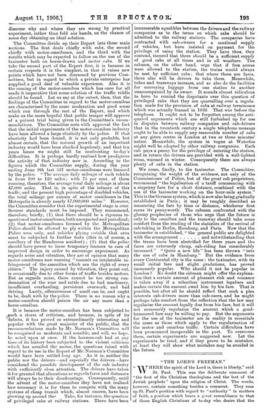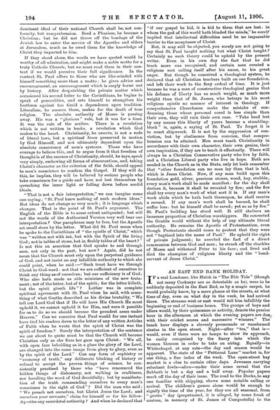"THE LORD'S FREEMAN."
WHERE the spirit of the Lord is, there is liberty," said St. Paul. This was the deliberate comment of "the first of the Christian theologians and the last of the Jewish prophets" upon the religion of Christ. The words, however, contain something besides a comment. They sum up St. Paul's position with regard to " authority " in matters of faith, a position which bears a great resemblance to that of those English Christians of to-day who desire that the
dominant ideal of their national Church shall be, not con- formity, but comprehension. Bred a Pharisee, be became a Christian ; but be did not throw off the bondage of the Jewish law to enter the service of the Apostles and elders at Jerusalem, much as he owed them for the knowledge of Christ they imparted to him.
If they stood alone, the words we have quoted would be worthy of all admiration, and might make a noble motto for a truly Catholic Church; but we must read them in their con- text if we would perceive their full significance. In the context St. Paul offers to those who are like-minded with himself something more than a motto : he gives advice and encouragement, an encouragement which is amply borne out by history. After despatching the private matter which occasioned his second letter to the Corinthians, he begins to speak of generalities, and sets himself to strengthen his brethren against too timid a dependence upon tradition.
Literalism, he assures them, makes for the death of true religion. The absolute authority of Moses is passing away. His was a " glorious " rule, but it was for a time.
It was the rule of the scribes. There is a revelation which is not written in books, a revelation which God makes to the heart. Christianity, he asserts, is not a code of literal laws, but a spiritual force preserved in motion by God Himself, and not ultimately dependent upon the absolute consistency of men's systems. Those who have courage to believe this, and to argue from it that freedom of thought is of the essence of Christianity, should, he eays, speak very simply, eschewing all forms of obscurantism, and, taking Christ's character as the criterion of the faith, should appeal to men's conscience to confirm the Gospel. If they will do this, he implies, they will be believed by serious people who take conscience for a guide and have not lost themselves by quenching the inner light or falling down before sordid ideals.
"That is not a fair interpretation," we can imagine some one saying ; "St. Paul knew nothing of such modern ideas."
But ideas do not change so very much ; it is language which changes. That is the point of St. Paul's argument. The English of the Bible is to some extent antiquated ; but will not the words of the Authorised Version very well bear our interpretation ? Our paraphrase may be free, but the Apostle set small store by the letter. What did St Paul mean when he spoke to the Corinthians of "the epistle of Christ," which was "written not with ink, but with the Spirit of the living God ; not in tables of stone, but in fleshly tables of the heart?" Is not this an assertion that God speaks to and through men, not only in the past, but now ? Again, did he not mean that the Church must rely upon the perpetual guidance of God, and not insist on any infallible authority to which she could point, when he said :—" Such trust have we through Christ to God-ward : not that we are sufficient of ourselves to think any thing as of ourselves; but our sufficiency is of God ; Who also hath made us able ministers of the new testa- ment; not of the letter, but of the spirit; for the letter killeth, but the spirit giveth life " ? Luther was in complete spiritual agreement with St. Paul when he said, with some- thing of what Goethe described as his divine brutality, "We tell our Lord God that if He will have His Church He must uphold it, we cannot uphold it for Him, and were it possible for us to do so we should become the proudest asses under Heaven." Can we conceive that Paul would for one instant have tied his readers down to the letter of any written Articles of Faith when he wrote that the spirit of Christ was the spirit of freedom ? Surely the interpretation of the sentence we are about to quote must be that the Church will become Christian only as she fixes her gaze upon Christ : "We all, with open face beholding as in a glass the glory of the Lord, are changed into the same image from glory to glory, even as by the spirit of the Lord." Can any form of sophistry or "economy of truth," any deliberate blinking of history or refusal to accept the proven things of science, be con- sistently practised by those who "have renounced the hidden things of dishonesty, not walking in craftiness, nor handling the word of God deceitfully; but by manifesta- tion of the truth commending ourselves to every man's conscience in the sight of God" ? Did the man who said : "We preach not ourselves, but Christ Jesus the Lord ; and ourselves your servants," claim for himself or for his fellow- Apostles any sacerdotal authority ? And when he declared that
"if our gospel be hid, it is hid to them that are lost: in whom the god of this world bath blinded the minds," he surely implied that intellectual difficulties need be no impassable barrier to the acceptance of Christ.
But, it may still be objected, you surely are not going to say that St. Paul taught nothing but what Christ taught ? Certainly no such theory could be upheld by the present writer. Even in his own day the fact that he did teach more was recognised, and certain men created a religious sect calling itself after his name, to his great anger. But though he conceived a theological system, he declared that all Christian teachers built on one foundation, and left their work to the fiery ordeal of time. It is just because he was a man of constructive theological genius that his defence of liberty has so much weight, so much more weight than that of St. James, who betrays in his most religious epistle no manner of interest in theology. If comprehensive Churchmen make the mistake of con- demning those whose personal creed is less simple than their own, they will ruin their own case. "Take heed lest by any means this liberty of yours become a stumbling- block" is, again, a saying of St. Paul. To forget it is to court shipwreck. It is not by the suppression of con- viction, but by abstinence from coercion, that compre- hension can be attained. Men must teach Christianity in accordance with their own character, their own genius, their own inspiration, if they are to teach it effectually. There will always be a Christian Conservative party who live by faith, and a Christian Liberal party who live in hope. Both are needed in the Church as in the State, only let both remember that "other foundation can no man lay than that is laid, which is Jesus Christ. Now, if any man build upon this foundation gold, silver, precious stones, wood, hay, stubble; every man's work shall be made manifest : for the day shall declare it, because it shall be revealed by fire; and the fire shall try every man's work of what sort it is. If any man's work abide which he bath built thereupon, he shall receive a reward. If any man's work shall be burned, he shall suffer loss : but he himself shall be saved; yet so as by fire." St. Paul's building has stood well. It still shelters an immense proportion of Christian worshippers. H,e converted the Gentile world without the help of any ultimate literal authority. He remains the Apostle of Protestantism, even though Protestants should come to protest that they were not "baptised into the name of Paul." He upheld the right of private judgment ; he asserted the fact of a direct communion between God and man; he struck off the shackles of Moses and withstood Peter to his face ; and lived and died the champion of religious liberty and the "bond- servant of Jesus Christ."



































 Previous page
Previous page